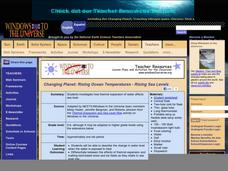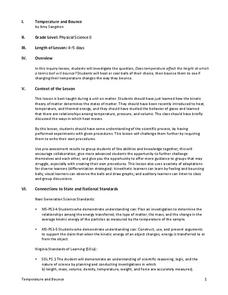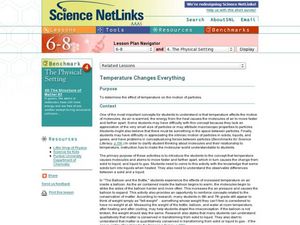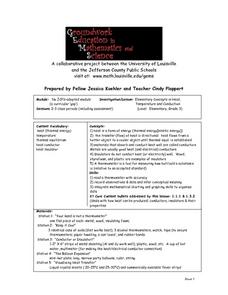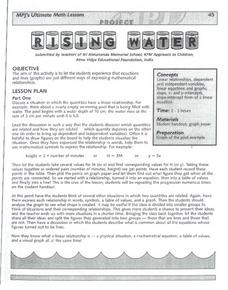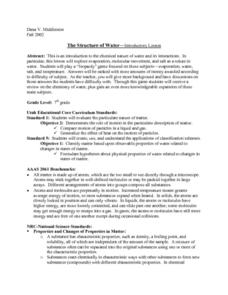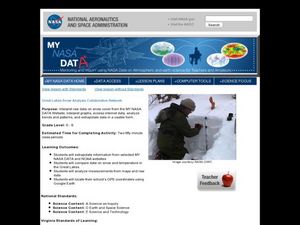Curated OER
Changing Planet: Rising Ocean Temperatures - Rising Sea Levels
As an anticipatory set, young environmental technicians watch a video about how ocean temperatures seem to be changing along with the global climate. They perform a laboratory demonstration with the purpose of observing what happens to...
Space Awareness
Water is a Heat Sink
One of the key objectives of Europe's Copernicus Earth program is to monitor the temperatures of the oceans and seas on Earth. Young scholars learn the effects of different heat capacities through two experiments. These experiments...
Curated OER
Thermal Expansion and Sea Level Rise
Placing a thermometer and a glass tube into a flask of cold water and sealing it, you can expose it to heat and very visually demonstrate thermal expansion to your earth science class. Follow it with a discussion about how the increasing...
STEM for Teachers
Temperature and Bounce
Take part in a fun experiment and hold an impromptu bouncing contest with your class. Young scientists heat and cool balls before bouncing them to determine whether temperature changes affect how they bounce. The set of STEM lesson plans...
Curated OER
Temperature Changes Everything
Middle school chemists visit interactive websites in order to discover what happens to molecular motion when heat is added to matter. They conduct an experiment that demonstrates the expansion of matter with the addition of heat. A lab...
Curated OER
Thermal Expansion
Students examine how thermal expansion of water can affect sea level. They conduct an experiment that demonstrates what happens to water levels when exposed to heat, record the results on a data sheet, and discuss the results.
Curated OER
Elementary Concepts in Heat
Third graders read a thermometer with accuracy, record observations and data, and infer conceptual meaning. They integrate mathematical charting and graphing skills to organize their data. They explore what happens when they touch or use...
Curated OER
What is Temperature?
Young scholars study the effects of temperature and air expansion. In this temperature lesson, students discuss temperature and participate in a role play of low energy and high energy molecules. Young scholars then discuss their...
Space Awareness
Oceans on the Rise
Temperature rises and land disappears! Through a lab exploration, learners understand the effect of temperature increase on water similar to the effect of global warming on our oceans. As they heat the water in a flask, they measure the...
Curated OER
Heat Unit
Students define thermal equilibrium. They distinguish between internal energy and heat. Students describe how the quantity of heat that enters or leaves a substance is measured.
Curated OER
Thermal Energy and Heat Unit
Young scholars explain that heat energy in a material consists of the disordered motions of its atoms or molecules. They know and explain that transformations of energy usually transform some energy into the form of heat, which...
US Environmental Protection Agency
Sea Level: On the Rise
With the global temperature on the rise, the effects of climate change are starting to be seen. However, many people have a difficult time conceptualizing the long-term effects, such as sea levels rising. Given an easy and effective...
Curated OER
What is Temperature?
Students examine how temperature is the measure of the average kinetic energy of the molecules of a substance.
Curated OER
Ocean Impacts of an El Nino Event
Young scholars study sea surface height and temperature and other characteristics of an El Nino. In this ocean impacts lesson students examine the factors that influence an El Nino or La Nina.
Curated OER
The Same but Different Part II
Third graders experiment with beakers of water and balloons to measure the volume of the gas in the balloon. They determine ways to change the volume of air in the balloon which changes its size but not its physical state. By heating the...
Curated OER
Air Expansion and Contraction
Students observe that air exerts pressure, that heated air expands and that cooled air contracts. After the demonstration, students engage in a question and answer session about what they saw.
National Wildlife Federation
The Tide is High, but I’m Holding On… Using ICESat Data to Investigate Sea Level Rise
Based on the rate of melting observed from 2003-2007 in Greenland, it would take less than 10 minutes to fill the Dallas Cowboys' Stadium. The 17th instructional activity in a series of 21 has scholars use the ICESat data to understand...
Curated OER
Weather and Wind
Students study wind and its effect on weather. In this investigative lesson students write a report on wind and weather and create a movement sequence.
Curated OER
Rising Water!
Students observe water change from a liquid to a gas state when heated and then return to its liquid stage when cooled. They learn that gas molecules move faster than liquid molecules. They discover physical properties that describe how...
Curated OER
Properties of Matter
Students describe four states of matter and their characteristics, explain thermal expansion of matter, interpret state changes in terms of kinetic theory of matter, explain relationship between temperature and volume of a gas, state...
American Chemical Society
Moving Molecules in a Solid
Who likes magic shows? In the fourth of five lessons, pupils view a scientific magic trick. The ball fits through the ring easily, but then moments later, it won't pass through anymore. What changed? Can we reverse the change? Scholars...
Curated OER
The Chemical Nature of Water
Seventh graders simulate a Jeopardy game to examine the chemical nature of water. Among the topics featured are evaporation, water, salt, and temperature. finally, as review, 7th graders answer a battery of questions presented by the...
National Wildlife Federation
When It Rains It Pours More Drought and More Heavy Rainfall
Which is worse — drought or flooding? Neither is helpful to the environment, and both are increasing due to climate change. The 16th lesson in a series of 21 covers the average precipitation trends for two different climates within the...
Curated OER
Great Lakes Snow Analysis Collaborative Network
Learners interpret data on snow cover and analyze trend patterns. In this snow instructional activity students compare data and locate their school's GPS coordinates.


